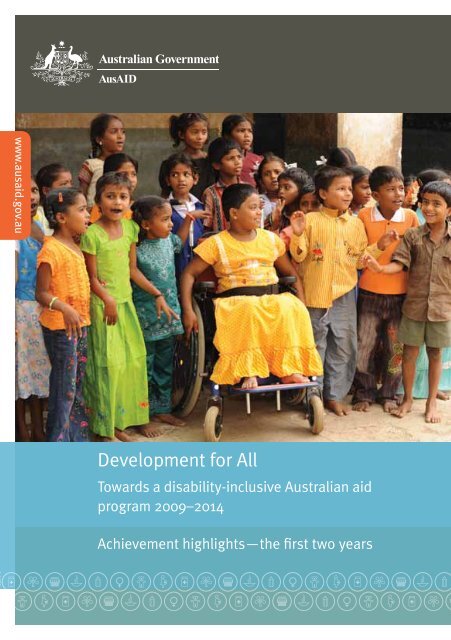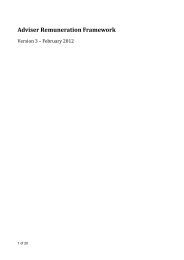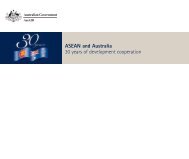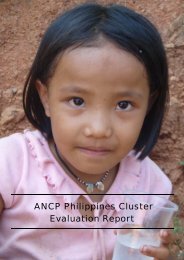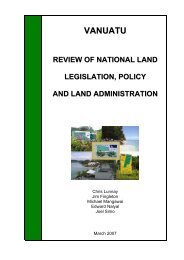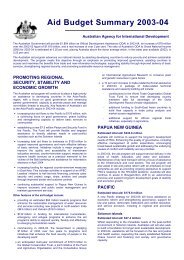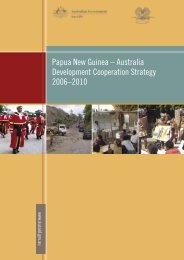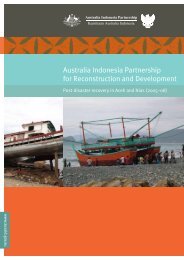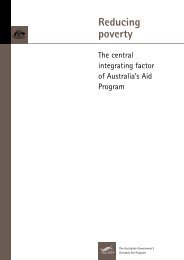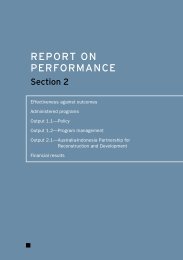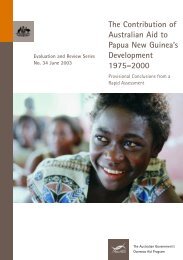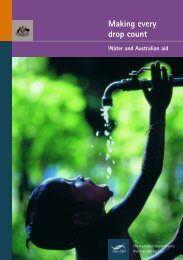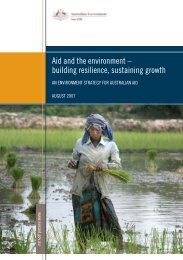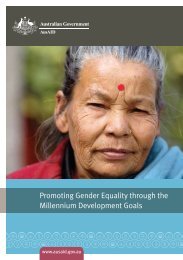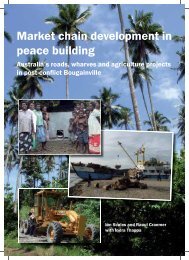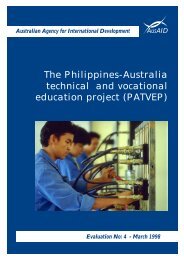Development for All: Towards a disability-inclusive ... - AusAID
Development for All: Towards a disability-inclusive ... - AusAID
Development for All: Towards a disability-inclusive ... - AusAID
Create successful ePaper yourself
Turn your PDF publications into a flip-book with our unique Google optimized e-Paper software.
<strong>Development</strong> <strong>for</strong> <strong>All</strong><br />
<strong>Towards</strong> a <strong>disability</strong>-<strong>inclusive</strong> Australian aid<br />
program 2009–2014<br />
Achievement highlights—the first two years
Australia is strongly committed to the United Nations<br />
Convention on the Rights of Persons with Disabilities<br />
People with <strong>disability</strong> are entitled to the same rights as all others.<br />
Australia <strong>for</strong>mally recognised this by ratifying the United Nations<br />
Convention on the Rights of Persons with Disabilities in 2008, and<br />
acceding to the Optional Protocol in 2009. In this context, people with<br />
<strong>disability</strong> are viewed as citizens with rights, not objects of charity.<br />
The purpose of the Convention is to promote, protect and ensure the full<br />
and equal enjoyment of all human rights and fundamental freedoms by all<br />
people with <strong>disability</strong>, and to promote respect <strong>for</strong> their inherent dignity.<br />
Article 32 of the Convention requires parties to ensure that international<br />
cooperation, including international development programs, is <strong>inclusive</strong><br />
of and accessible to people with <strong>disability</strong>.<br />
Australia recognises that to meet our obligations under the Convention<br />
and achieve the Millennium <strong>Development</strong> Goals, it is essential that<br />
international cooperation not only reaches people with <strong>disability</strong>—who<br />
make up 20 per cent of the poorest—but also empowers them to play an<br />
active role in development processes.
Ministerial <strong>for</strong>eword<br />
I am very proud to release this first report<br />
on our progress towards ensuring that<br />
Australian aid benefits people with <strong>disability</strong>.<br />
Ten percent of the world’s population—an<br />
estimated 650 million people—are living<br />
with <strong>disability</strong> and 80 per cent of these<br />
people live in developing countries. In Asia<br />
and the Pacific region this translates to more than 400 million people,<br />
across all communities.<br />
<strong>All</strong> too frequently, people with <strong>disability</strong> do not share the same rights and<br />
cannot access the same services as others. They are much less likely to<br />
go to school, get a job, own a home or have a family. A range of barriers<br />
prevent them from fully participating in social, economic and political<br />
life. Existing development programs do not always reach the poorest of<br />
the poor—only 3 to 4 per cent of people with <strong>disability</strong> are estimated to<br />
benefit from international development assistance.<br />
In December 2008, on the 60th anniversary of the Universal Declaration<br />
of Human Rights, I declared in Parliament the Australian Government’s<br />
commitment to advancing human rights at home as well as abroad. One<br />
of the most important ways Australia can contribute to advancing human<br />
rights is through achieving the Millennium <strong>Development</strong> Goals <strong>for</strong> all.<br />
<strong>Development</strong> <strong>for</strong> <strong>All</strong>: Achievement highlights 1
We moved quickly to put this commitment into action with the launch<br />
of the first <strong>disability</strong> strategy <strong>for</strong> Australia’s aid program—<strong>Development</strong><br />
<strong>for</strong> <strong>All</strong>: <strong>Towards</strong> a <strong>disability</strong>-<strong>inclusive</strong> Australian aid program 2009–2014.<br />
In May 2010, the government reaffirmed this commitment to people<br />
with <strong>disability</strong> through a new $30.2 million budget initiative to fund the<br />
<strong>disability</strong>-specific measures in the strategy, bringing the total budget<br />
allocated to <strong>disability</strong> since 2008 to $88 million.<br />
This report highlights the early achievements in making Australia’s<br />
aid program more effective through a focus on including people with<br />
<strong>disability</strong>. I am especially pleased to see the contribution and strong<br />
leadership from people with <strong>disability</strong> and our partner governments in<br />
promoting <strong>inclusive</strong> national development.<br />
This is a solid beginning, but it is just a beginning. There is much<br />
more that can be done and the Australian Government remains<br />
committed to pursuing the vision articulated in <strong>Development</strong> <strong>for</strong> <strong>All</strong><br />
in the coming years.<br />
Kevin Rudd<br />
Minister <strong>for</strong> Foreign Affairs<br />
December 2010<br />
2 <strong>Development</strong> <strong>for</strong> <strong>All</strong>: Achievement highlights
Contents<br />
Ministerial <strong>for</strong>eword 1<br />
Introduction 4<br />
People with <strong>disability</strong>: speaking out on <strong>disability</strong> rights 6<br />
Building strong, effective disabled people’s organisations 8<br />
Active central role <strong>for</strong> people with <strong>disability</strong> 12<br />
Partner governments meeting the needs of all citizens 14<br />
Education <strong>for</strong> all children 16<br />
Accessible environments 18<br />
Changing how <strong>AusAID</strong> works: improving aid effectiveness 20<br />
Australian leadership to mobilise global action<br />
and resources 22<br />
Senior Australian officials advocating <strong>for</strong> <strong>disability</strong> rights 24<br />
<strong>AusAID</strong>: an open, accessible and <strong>inclusive</strong> organisation 26<br />
<strong>AusAID</strong> <strong>disability</strong> and development resources 28<br />
<strong>Development</strong> <strong>for</strong> <strong>All</strong>: Achievement highlights 3
Introduction<br />
In November 2008, Australia launched its first <strong>disability</strong> strategy <strong>for</strong><br />
the aid program—<strong>Development</strong> <strong>for</strong> <strong>All</strong>: <strong>Towards</strong> a <strong>disability</strong>-<strong>inclusive</strong><br />
Australian aid program—marking a change in the way the aid program<br />
is designed and delivered. Two years into its implementation, there are<br />
strong signs that the strategy is working and improving the reach and<br />
effectiveness of Australia’s aid program.<br />
People with <strong>disability</strong> are increasingly taking a central role in decision<br />
making, ensuring that policies and programs are shaped to better take<br />
account of their requirements.<br />
Australia’s partnerships with the governments of Cambodia and<br />
East Timor are bolstering ef<strong>for</strong>ts towards more equitable national<br />
development that benefits all citizens, including people with <strong>disability</strong>.<br />
Our international leadership in this area is reaping tangible benefits.<br />
The global community is increasing the priority given to <strong>disability</strong>. More<br />
resources are being allocated to effect change. This is especially evident<br />
in ensuring that people with <strong>disability</strong> are no longer invisible from global<br />
action to achieve the Millennium <strong>Development</strong> Goals.<br />
<strong>AusAID</strong> is progressively changing how we work to ensure that people<br />
with <strong>disability</strong> participate in, contribute to and benefit equally from<br />
Australia’s aid program. Our processes and systems and in<strong>for</strong>mation<br />
about our programs are becoming increasingly accessible to and<br />
<strong>inclusive</strong> of people with <strong>disability</strong>. The design and evaluation of<br />
4 <strong>Development</strong> <strong>for</strong> <strong>All</strong>: Achievement highlights
programs are being strengthened by better analysis on the situation of<br />
people with <strong>disability</strong> and their families and communities.<br />
Given that people with <strong>disability</strong> make up at least 20 per cent of the<br />
poorest in developing countries, these improvements in how Australian<br />
aid is being designed and delivered will go a long way to achieving the<br />
Millennium <strong>Development</strong> Goals.<br />
Pictured are the first Samoan students with hearing impairment that are accessing secondary education in<br />
a regular setting at Faatuatua Christian Secondary School in Samoa.<br />
Back row (L-R): Melissa Resitala, Leone L Peteru, Cassandra Havili. Front row (L-R): Seinafo Mavaega,<br />
Simona Simati, Russell Watts, Maselina Iuta, Eli Tafola<br />
Photo: Sue Rasmussen, Photo Centre<br />
With Australian support through the Samoa Inclusive Education Demonstration<br />
Program, SENESE is assisting local staff at Faatuatua to include students who are<br />
deaf in school lessons. Two of these students have completed work experience in<br />
2010 and have gained full-time employment <strong>for</strong> 2011 as a result. Families of these<br />
children receive support in their village by a local outreach worker who teaches<br />
weekly sign language lessons. SENESE is also being supported by Australian<br />
volunteer Russell Watts to train local staff in advanced-level interpreting.<br />
<strong>Development</strong> <strong>for</strong> <strong>All</strong>: Achievement highlights 5
People with <strong>disability</strong>:<br />
speaking out on <strong>disability</strong> rights<br />
People with <strong>disability</strong> traditionally have lacked a voice on the global<br />
social, political and economic stage. In developing countries, the<br />
conservative estimate is that they make up 20 per cent of the poorest.<br />
For development to reach and benefit all, people with <strong>disability</strong> must be<br />
included as active participants.<br />
Empowerment and active participation of people with <strong>disability</strong> is an<br />
important objective of Australia’s <strong>Development</strong> <strong>for</strong> <strong>All</strong> strategy.<br />
Having a voice—the Disability Rights Fund<br />
Australia contributes to and is a steering committee member of the Disability<br />
Rights Fund. This global pooled fund enables disabled people’s organisations<br />
(DPOs) to raise awareness and support ef<strong>for</strong>ts towards achieving the<br />
objectives of the Convention on the Rights of Persons with Disabilities.<br />
From 2008–09 to 2010–11 Australia will have contributed $2 million to<br />
the Disability Rights Fund, enabling it to expand its reach to DPOs in<br />
14 Pacific Island countries and Indonesia. Examples of projects funded in<br />
the region include:<br />
> > $20 000 to People with Disabilities Solomon Islands to expand<br />
awareness of the Convention through outreach to remote areas and<br />
building partnerships with service providers and other DPOs<br />
> > $15 000 to Fiji Youth Champs <strong>for</strong> Mental Health to build a media bank of<br />
youth who speak out about their experience with psycho-social disabilities.<br />
6 <strong>Development</strong> <strong>for</strong> <strong>All</strong>: Achievement highlights
Disability Rights Fund Director Diana Samarasan visits grantee Little People of Uganda.<br />
Photo: Frederick Ouko Alucheli, Disability Rights Fund Advisor<br />
Little People of Uganda is a marginalised group, excluded even from their national<br />
<strong>disability</strong> movement. Through a $5000 grant from the Disability Rights Fund in 2009,<br />
Little People of Uganda gathered their membership from across the country to learn<br />
about the Convention and to build an advocacy plan addressing their rights. Within<br />
a few months, they had gained national media attention and secured a meeting with<br />
the Commissioner <strong>for</strong> Disability and the Elderly. During a meeting of fund grantees,<br />
they successfully confronted their exclusion from the <strong>disability</strong> movement. Today,<br />
with additional financial support, Little People of Uganda is collecting data on and<br />
addressing human rights abuses against people of short stature in Uganda.<br />
<strong>Development</strong> <strong>for</strong> <strong>All</strong>: Achievement highlights 7
Building strong, effective disabled<br />
people’s organisations<br />
DPOs are organisations established and run by people with <strong>disability</strong>.<br />
They work towards <strong>inclusive</strong>, barrier-free and gender-equitable societies<br />
that recognise the rights, citizenship, participation and contributions of<br />
people with <strong>disability</strong>. DPOs are mandated under the Convention to work<br />
with governments <strong>for</strong> the achievement of rights of people with <strong>disability</strong>.<br />
As people with <strong>disability</strong> are often denied access to education and other<br />
development opportunities, they can lack basic literacy, numeracy and<br />
computer skills as well as experience in organisational management.<br />
An important early initiative under <strong>Development</strong> <strong>for</strong> <strong>All</strong> has been<br />
assisting DPOs to strengthen their capacity to deliver on their mandate<br />
to drive more equitable development.<br />
> > In 2009, Australia provided $150 000 to people with <strong>disability</strong> and<br />
their representative organisations in Cambodia to strengthen<br />
capacity in rural provinces and provide opportunities to develop<br />
leadership skills. Around 80 people with <strong>disability</strong> received leadership<br />
training in 2009–10, including provincial members. More than<br />
60 people with <strong>disability</strong> are enrolled in English language courses<br />
which will enable them to apply <strong>for</strong> Australian <strong>Development</strong><br />
Scholarships in 2012.<br />
8 <strong>Development</strong> <strong>for</strong> <strong>All</strong>: Achievement highlights
Australia has partnered with the Government of New Zealand to<br />
support the Pacific Disability Forum, the Pacific region’s umbrella DPO.<br />
Since 2009, Australia’s support of $450 000 is enabling the <strong>for</strong>um to<br />
increase the scale and effectiveness of its activities. These include<br />
strengthening members’ capacity to raise awareness of <strong>disability</strong><br />
rights and to provide advice to governments on policies and budgets,<br />
to ensure equal access and full participation by people with <strong>disability</strong>.<br />
Setareki S Macanawai, Chief Executive Officer, Pacific Disability Forum (centre), chairing a panel discussion<br />
at the 2010 Australian Disability and <strong>Development</strong> Consortium Conference with Dame Carol Kidu, DBE,<br />
Minister <strong>for</strong> Community <strong>Development</strong> in Papua New Guinea (right), and David Lewis, CBM Australia (left).<br />
Photo: Christine Walton, Australian Disability and <strong>Development</strong> Consortium<br />
<strong>Development</strong> <strong>for</strong> <strong>All</strong>: Achievement highlights 9
Australia supported the inaugural Pacific Islands Forum Disability Ministers’ Meeting in the Cook Islands,<br />
October 2009. For the first time, civil society including DPOs were engaged as <strong>for</strong>mal members of the<br />
delegations to the <strong>for</strong>um.<br />
Photo: Pacific Islands Forum Secretariat<br />
10 <strong>Development</strong> <strong>for</strong> <strong>All</strong>: Achievement highlights
<strong>Development</strong> <strong>for</strong> <strong>All</strong>: Achievement highlights 11
Active central role <strong>for</strong> people<br />
with disabilty<br />
People with <strong>disability</strong> are best placed to in<strong>for</strong>m and guide decisions,<br />
policies and programs to ensure their particular requirements are<br />
accounted <strong>for</strong>. However, they have historically been left out of<br />
consultation and decision-making processes.<br />
<strong>Development</strong> <strong>for</strong> <strong>All</strong> recognises that how the aid program works is as<br />
important as what is done. Promoting and enabling active participation<br />
of people with <strong>disability</strong> is a fundamental guiding principle <strong>for</strong> <strong>AusAID</strong>’s<br />
work.<br />
People with <strong>disability</strong> improving aid effectiveness<br />
<strong>AusAID</strong> is increasingly including people with <strong>disability</strong> in program design<br />
and decision-making and measuring outcomes of development activities<br />
so that Australian aid reaches and benefits everyone.<br />
> > People with <strong>disability</strong> have been represented on the Australian<br />
<strong>Development</strong> Research Awards selection committee since 2008.<br />
> > The Pacific Disability Forum was consulted on the design of the new<br />
phase of the Australia–Pacific Technical College.<br />
> > <strong>AusAID</strong>’s scholarships team has engaged a consultant with <strong>disability</strong><br />
to develop a reasonable adjustments policy—improving access to<br />
appropriate assistance so scholars with disabilities can fulfil their<br />
learning objectives.<br />
12 <strong>Development</strong> <strong>for</strong> <strong>All</strong>: Achievement highlights
Disability-Inclusive <strong>Development</strong> Reference Group<br />
In June 2009, <strong>AusAID</strong> established a Disability-Inclusive <strong>Development</strong><br />
Reference Group to provide high-level guidance and help shape the<br />
implementation of <strong>Development</strong> <strong>for</strong> <strong>All</strong>. The five-member reference<br />
group is an honorary panel of leaders drawn from development agencies,<br />
civil society and academia. The group has extensive experience in<br />
<strong>inclusive</strong> development and includes people with <strong>disability</strong>.<br />
The reference group has convened four times with the most recent<br />
meeting held in Cambodia in August 2010. Group members met with<br />
Australian Embassy staff, Cambodian Government counterparts, DPOs<br />
and NGOs. They witnessed first-hand the Australian aid program’s<br />
positive impact on Cambodian people with <strong>disability</strong> and broadened<br />
their understanding of how <strong>Development</strong> <strong>for</strong> <strong>All</strong> is changing <strong>AusAID</strong>’s<br />
work abroad.<br />
Members of <strong>AusAID</strong>’s Disability-Inclusive <strong>Development</strong> Reference Group<br />
with <strong>AusAID</strong> Director Disability-Inclusive <strong>Development</strong>, Kristen Pratt,<br />
and observer Ingar Düring, Head of the Sector Initiative Persons with<br />
Disabilities, Social Protection Section, GTZ, during their August 2010<br />
meeting in Phnom Penh, Cambodia.<br />
Reference group member Rosemary Kayess, Visiting Fellow, International<br />
Human Rights Law, Faculty of Law, University of New South Wales, was<br />
unable to be present <strong>for</strong> this photo.<br />
Front (L–R): Kristen Pratt; Charlotte McClain-Nhlapo, Senior Operations<br />
Officer, World Bank; Megan McCoy, Pacific Regional Human <strong>Development</strong><br />
Programme Officer, NZAID.<br />
Back (L–R): Christine Walton, Executive Officer, Australian Disability and<br />
<strong>Development</strong> Consortium; Setareki S Macanawai, Chief Executive Officer,<br />
Pacific Disability Forum; Ingar Düring.<br />
Photo: Sokunthea Chhor<br />
<strong>Development</strong> <strong>for</strong> <strong>All</strong>: Achievement highlights 13
Partner governments meeting the<br />
needs of all citizens<br />
Good governance meets the needs of all citizens, including people with<br />
<strong>disability</strong>. Australia is supporting partner governments’ ef<strong>for</strong>ts where<br />
there is strong national commitment and action to ensure the rights of<br />
people with <strong>disability</strong>.<br />
East Timor<br />
The Government of East Timor has demonstrated an increasing<br />
commitment to ensuring that its citizens with <strong>disability</strong> are able to<br />
participate in, contribute to and benefit from national development.<br />
In 2009, Australia provided $300 000 to enable the Ministry of Social<br />
Solidarity to finalise East Timor’s <strong>disability</strong> strategy and implementation<br />
framework. This assistance also included support <strong>for</strong>:<br />
> > establishing a government–civil society working group to oversee policy<br />
implementation, including the membership of East Timor’s first DPO, the<br />
Association <strong>for</strong> the Equality of the Disabled People of Timor, or ASSERT<br />
> > expanding community-based rehabilitation to promote collaboration<br />
among local leaders, people with <strong>disability</strong>, their families, and other<br />
concerned citizens to provide equal opportunities <strong>for</strong> all people in<br />
the community<br />
> > developing the draft ‘National <strong>disability</strong> policy <strong>for</strong> Timor-Leste—<br />
<strong>Towards</strong> a <strong>disability</strong>-<strong>inclusive</strong> Timor-Leste’ <strong>for</strong> public comment. The<br />
document is expected to be finalised in late 2010.<br />
14 <strong>Development</strong> <strong>for</strong> <strong>All</strong>: Achievement highlights
Cambodia<br />
In February 2009, Australia recognised the Royal Government of<br />
Cambodia’s commitment to addressing the barriers experienced by<br />
people with <strong>disability</strong> in accessing social and economic opportunities.<br />
Australia has provided $1.5 million in support since 2009 towards ef<strong>for</strong>ts<br />
<strong>for</strong> <strong>inclusive</strong> national development. The Royal Government of Cambodia’s<br />
achievements include:<br />
> > enacting a law to promote the rights of people with <strong>disability</strong><br />
> > developing a national plan of action <strong>for</strong> people with <strong>disability</strong><br />
> > appointing a national <strong>disability</strong>-<strong>inclusive</strong> development adviser to<br />
strengthen leadership and management of the <strong>disability</strong> sector and<br />
work of staff in relevant ministries<br />
> > establishing a technical working group to implement a 10-stage<br />
process towards ratification of the Convention.<br />
Mr Yi Veasna, Director of Cambodia’s<br />
National Centre of Disabled People,<br />
speaking at the national workshop in<br />
May 2010 to promote the adoption of<br />
the law and endorsement of the national<br />
plan of action. Australia’s Ambassador,<br />
HE Ms Margaret Adamson, was a keynote<br />
speaker at the workshop, which drew<br />
more than 300 attendees. Photo: <strong>AusAID</strong><br />
<strong>Development</strong> <strong>for</strong> <strong>All</strong>: Achievement highlights 15
Education <strong>for</strong> all children<br />
‘Strikingly, 98 per cent of children with disabilities in developing countries do not<br />
attend school.’<br />
UNESCO, Policy brief on early childhood, June 2009<br />
Australia recognises that education is a great enabler. It opens two<br />
doors—social inclusion and economic opportunities—and is the<br />
plat<strong>for</strong>m <strong>for</strong> all other development objectives.<br />
Universal primary education goals set out in MDG 2 will not be met<br />
unless barriers to education <strong>for</strong> children with <strong>disability</strong> are removed.<br />
Australia is working to address the range of barriers, such as<br />
inaccessible school buildings, poorly trained teachers, inflexible<br />
curricula and a lack of <strong>disability</strong>-specific resources. Stigma and societal<br />
prejudices that fail to acknowledge the capacity and strengths of<br />
children with disabilities are also being addressed.<br />
> > In Samoa, Australia provided $1.3 million in 2009–10 to support<br />
the transition of children with hearing impairment and intellectual<br />
<strong>disability</strong> from primary to secondary school. The Ministry of Education,<br />
Sports and Culture is developing <strong>inclusive</strong> education policies and<br />
programs with our support.<br />
> > In Indonesia, the Australia Indonesia Basic Education Program is<br />
developing ministerial regulations on <strong>inclusive</strong> education, training<br />
personnel from the 2000 schools in the program, and piloting a model<br />
<strong>for</strong> <strong>inclusive</strong> education in five districts.<br />
16 <strong>Development</strong> <strong>for</strong> <strong>All</strong>: Achievement highlights
Front (L): Robert Yendegl, student at Taurama Primary School in Papua New Guinea. Photo: Rocky Roe<br />
Robert Yendegl dreams of becoming a pilot—and he wants to fly big planes, not<br />
small ones. Robbie is in Grade 5 at Taurama Primary School, a small mainstream<br />
school on the outskirts of Port Moresby. Papua New Guinea’s Department of<br />
Education is focusing its ef<strong>for</strong>ts <strong>for</strong> students like Robbie, by training teachers<br />
to integrate students with special needs into mainstream schools. While some<br />
encouraging work is underway, there are still challenges.<br />
‘It basically comes down to a lack of manpower’, explained Jennifer Tamarua, who is<br />
Head of Inclusive Education with the Department of Education. There are 21 Special<br />
Education Resource Centres covering 17 provinces in Papua New Guinea, with 4 to 11<br />
staff in each centre.<br />
‘If we can reach up to 10 schools each year, and bring them on board to thinking<br />
about students with a <strong>disability</strong> and how they can best educate them in the context<br />
of a mainstream education system, we are getting there’, said Mrs Tamarua.<br />
And as <strong>for</strong> Robbie, the 12-year-old has a big goal <strong>for</strong> 2011: to be a vice class captain.<br />
> > In Papua New Guinea, Australia has provided <strong>disability</strong>-<strong>inclusive</strong><br />
training to 50 Special Education Resource Centre staff, 25 teacher<br />
education lecturers and approximately 300 school-based counselors.<br />
<strong>Development</strong> <strong>for</strong> <strong>All</strong>: Achievement highlights 17
Accessible environments<br />
Accessible, barrier-free built environments are essential <strong>for</strong> making sure<br />
that people with <strong>disability</strong> can participate in all areas of community life.<br />
However, many cannot access services or the communities in which<br />
they live. Accessible infrastructure provides a better environment <strong>for</strong> all,<br />
including older people, people with temporary impairments, pregnant<br />
women and parents with young children.<br />
Australia is working with partners to ensure that new roads, buildings,<br />
facilities and transport, including rebuilding after natural disasters and<br />
conflict, are accessible to all.<br />
> > In Indonesia, approximately 1000 junior secondary schools<br />
constructed with Australian assistance have been built with ramps<br />
and accessible toilets, enhancing access to education <strong>for</strong> students<br />
with <strong>disability</strong>.<br />
> > The Australia – Papua New Guinea Basic Education <strong>Development</strong><br />
Program is supporting the Department of Education to produce<br />
infrastructure guidelines <strong>for</strong> elementary, community and primary<br />
schools, including access <strong>for</strong> students with <strong>disability</strong>.<br />
> > A new <strong>AusAID</strong> Civil Society Water, Sanitation and Hygiene Fund of<br />
$32.6 million will strengthen NGO activities to improve water quality,<br />
sanitation and hygiene, ensuring access <strong>for</strong> people with <strong>disability</strong>.<br />
18 <strong>Development</strong> <strong>for</strong> <strong>All</strong>: Achievement highlights
Local work crews outside the Auki Courthouse in Malaita, Solomon Islands. Photo: Sinclair Knight Merz<br />
Funded by Australia through the Regional Assistance Mission to Solomon Islands,<br />
the Auki Courthouse was modified during construction to comply with <strong>Development</strong><br />
<strong>for</strong> <strong>All</strong>. The toilet, bathroom and kitchen facilities are accessible <strong>for</strong> people with<br />
<strong>disability</strong> and a ramp was added to improve access to the courtrooms and registry.<br />
> > Jointly supported by the Australian and New Zealand governments,<br />
the Pacific Eye Institute in Fiji provides eye care training <strong>for</strong><br />
ophthalmologists, doctors and nurses from around the Pacific and<br />
served 20 000 patients in 2009. Universal design principles were<br />
applied in the design and construction of the institute’s new building<br />
so that it can be accessed by everyone. The building will be a model of<br />
accessible infrastructure in the Pacific.<br />
Universal design guidelines are being finalised by <strong>AusAID</strong> to provide<br />
advice on how Australian aid activities involving the development of<br />
infrastructure (schools, health facilities, public buildings, roads and<br />
transport) can be more accessible to people with <strong>disability</strong>.<br />
<strong>Development</strong> <strong>for</strong> <strong>All</strong>: Achievement highlights 19
Changing how <strong>AusAID</strong> works:<br />
improving aid effectiveness<br />
Significant progress has been made to ensure that in<strong>for</strong>mation about<br />
<strong>AusAID</strong>’s programs is available in accessible <strong>for</strong>mats. Increasingly,<br />
programs are being designed and delivered so that people with<br />
<strong>disability</strong> are included and benefit from them—making the aid program<br />
more effective.<br />
Joel has just completed a master’s degree<br />
in in<strong>for</strong>mation technology at the University<br />
of Southern Queensland, which will help<br />
him overcome barriers to employment. The<br />
lack of adaptive supports and negative<br />
social attitudes have made it difficult <strong>for</strong><br />
Joel as a person with a hearing impairment<br />
in Papua New Guinea. ‘I wanted to show<br />
them that I can do it’, said Joel, who now<br />
has an ambition to return to Papua New<br />
Guinea and establish e-learning and distance<br />
education opportunities <strong>for</strong> other students<br />
with <strong>disability</strong>. In 2010, Joel was among the<br />
first cohort of scholars awarded a Prime<br />
Minister’s Pacific–Australia Award, which<br />
provides work placement and leadership<br />
training opportunities.<br />
Joel Silas, an Australian <strong>Development</strong><br />
Scholarship graduate at the University of<br />
Southern Queensland. Photo: Shannon<br />
Svenson, University of Southern Queensland<br />
20 <strong>Development</strong> <strong>for</strong> <strong>All</strong>: Achievement highlights
Since 2008, 120 students, most of whom were people with <strong>disability</strong>,<br />
have studied <strong>disability</strong> and development through the Australian<br />
Leadership Award Fellowships.<br />
> > From 2009, Australia’s Human Rights Small Grants Scheme has<br />
included a focus on <strong>disability</strong> rights. In the 2009 funding round, five<br />
of the 36 successful projects and almost $400 000 was provided to<br />
organisations promoting rights of people with <strong>disability</strong> in Burkina<br />
Faso, Iraq, Jamaica, Somaliland and Togo.<br />
> > Since 2008, 107 Australian volunteers have contributed to <strong>disability</strong>related<br />
fields during their placements overseas. Almost 25 per cent<br />
of the current Australian volunteers in Bangladesh are working with<br />
locals with <strong>disability</strong>.<br />
> > Australian <strong>Development</strong> Research Awards guidelines have been<br />
revised to include <strong>disability</strong> as a priority theme of research. In 2008<br />
and 2009, Australian and international partners were awarded a total<br />
of nearly $2 million to:<br />
––<br />
develop efficient ways of measuring the effectiveness of<br />
development activities that focus on or include people with <strong>disability</strong><br />
––<br />
investigate the economic costs of <strong>disability</strong>-related stigma in Vietnam<br />
––<br />
examine ways to improve access <strong>for</strong> people with <strong>disability</strong> through<br />
<strong>inclusive</strong> infrastructure development in Papua New Guinea.<br />
> > Australian <strong>Development</strong> Scholarships guidelines have been revised<br />
to promote access and inclusion, which has resulted in an increasing<br />
number of scholars with <strong>disability</strong>. Africa and Pakistan programs now<br />
include specific targets <strong>for</strong> awarding scholarships to people with<br />
<strong>disability</strong> or <strong>for</strong> study in a <strong>disability</strong>-related field.<br />
<strong>Development</strong> <strong>for</strong> <strong>All</strong>: Achievement highlights 21
Australian leadership to mobilise<br />
global action and resources<br />
‘The government … stands proudly in the strong tradition of the defence and<br />
promotion of human rights … [W]e believe in a creative use of diplomacy to build<br />
stronger human rights protections in every part of the world. Today this House<br />
affirms again … our resolve as a nation, as a government and as a people to work on<br />
our own soil and to work with governments around the world towards the realisation<br />
of these rights <strong>for</strong> all peoples.’<br />
Kevin Rudd, then Prime Minister of Australia, speech to the Parliament on the 60th<br />
anniversary of the Universal Declaration of Human Rights, December 2008<br />
Australia’s increased focus and leadership on <strong>disability</strong>-<strong>inclusive</strong><br />
development has contributed to a stronger response from the<br />
global community.<br />
> > Australia provided $200 000 to the Pacific Islands Forum Secretariat<br />
to host the inaugural Forum Disability Ministers’ Meeting in the Cook<br />
Islands, held in October 2009. Ministers, government representatives<br />
and DPOs all worked together to finalise and endorse the Pacific<br />
Regional Strategy on Disability 2010–2015 at the meeting. This<br />
was the first time a <strong>for</strong>um ministers’ meeting included community<br />
representatives. Contributions by people with <strong>disability</strong> were welcomed<br />
and demonstrated the value of <strong>inclusive</strong> development partnerships.<br />
> > Australia played a lead role in <strong>for</strong>ming the resolution ‘Realizing<br />
the Millennium <strong>Development</strong> Goals <strong>for</strong> persons with disabilities’,<br />
which was adopted by the United Nations General Assembly in<br />
November 2009.<br />
22 <strong>Development</strong> <strong>for</strong> <strong>All</strong>: Achievement highlights
Senior representatives at the Conference of States Parties to the Convention on the Rights of Persons with<br />
Disabilities Australia–UNICEF side event, September 2009.<br />
L–R: Victor Pineda, Victor Pineda Foundation; Bob McMullan, then Australian Parliamentary Secretary <strong>for</strong><br />
International <strong>Development</strong> Assistance; Hilde Johnson, Deputy Executive Director, UNICEF; Graeme Innes AM,<br />
Australia’s Disability Discrimination Commissioner. Photo: Trevor Collins<br />
> > At the 2009 Conference of States Parties to the Convention in New<br />
York, Australia initiated and co-hosted a major event with UNICEF on<br />
meeting the needs of children with <strong>disability</strong> through the Convention.<br />
UNICEF publicly committed to do more on education <strong>for</strong> children<br />
with <strong>disability</strong>.<br />
<strong>Development</strong> <strong>for</strong> <strong>All</strong>: Achievement highlights 23
Senior Australian officials<br />
advocating <strong>for</strong> <strong>disability</strong> rights<br />
‘Today development practices by and large exclude persons with disabilities.<br />
Australia’s leadership in <strong>disability</strong> <strong>inclusive</strong> development is highly regarded; not<br />
only at the strategic level such as influencing the recent UN resolution to realise<br />
the MDGs <strong>for</strong> persons with disabilities, but also at the program level—where senior<br />
Australian representatives are making a difference on the ground.’<br />
Charlotte McClain-Nhlapo, World Bank Senior Operations Officer<br />
The Convention calls <strong>for</strong> shared responsibility among all stakeholders<br />
and greater leadership by international donors so global development<br />
ef<strong>for</strong>ts are <strong>inclusive</strong> of and accessible to people with <strong>disability</strong>.<br />
Australian advocacy in Cambodia<br />
In August 2010, <strong>AusAID</strong>’s Disability-Inclusive <strong>Development</strong> Reference<br />
Group visited Australia’s mission in Cambodia. Australia’s Ambassador<br />
to Cambodia, HE Ms Margaret Adamson, led a meeting of the reference<br />
group with Minister Sam Heng, the Cambodian Minister <strong>for</strong> Social Affairs,<br />
Veterans and Youth Rehabilitation, and committed Australian support <strong>for</strong><br />
the government’s preparations to ratify the Convention.<br />
The reference group recognised the impact of the mission’s high-level<br />
engagement with the Cambodian Government to promote the inclusion<br />
of Cambodians with <strong>disability</strong> in national development. The group<br />
also considered the mission a model of good practice in inclusion. For<br />
example, people with <strong>disability</strong> were recruited into temporary vacancies<br />
which has led to permanent employment elsewhere.<br />
24 <strong>Development</strong> <strong>for</strong> <strong>All</strong>: Achievement highlights
HE Mr Ian Kemish, Australian High Commissioner to Papua New Guinea, opening a refurbished<br />
physiotherapy centre at Cheshire Disability Services. Photo: William Natera, Department of Foreign Affairs<br />
and Trade<br />
The main physiotherapy unit at Cheshire Disability Services in Papua New<br />
Guinea received much-needed renovations, furnishings <strong>for</strong> the exercise room<br />
and therapeutic equipment with the help of Australian Head of Mission Direct Aid<br />
Program funding. The upgraded facility will benefit residents with <strong>disability</strong>, staff<br />
and carers, and services will be extended to the community so that people can learn<br />
about <strong>disability</strong>.<br />
Australian advocacy in Papua New Guinea<br />
In September 2010, Australia’s High Commissioner to Papua New<br />
Guinea, HE Mr Ian Kemish, and his partner, Ms Roxanne Martens,<br />
hosted a development partner function focused on <strong>disability</strong>-<strong>inclusive</strong><br />
development. At the event, the United Nations committed to lead and<br />
coordinate donors’ actions on <strong>disability</strong>, particularly around education,<br />
and ensure <strong>disability</strong> is added to the agenda of future development<br />
meetings in Papua New Guinea.<br />
<strong>Development</strong> <strong>for</strong> <strong>All</strong>: Achievement highlights 25
<strong>AusAID</strong>: an open, accessible and<br />
<strong>inclusive</strong> organisation<br />
<strong>AusAID</strong> has strengthened corporate policies and practices,<br />
communication strategies and training programs to create a workplace<br />
that enables and promotes the inclusion of people with <strong>disability</strong>.<br />
> > The <strong>AusAID</strong> Disability Action Plan builds on the Workplace Diversity<br />
Program 2007–2010 and sets out per<strong>for</strong>mance indicators, measures<br />
and reporting in relation to <strong>AusAID</strong>’s employer and purchaser roles.<br />
The plan applies to all <strong>AusAID</strong> employees in Australia and overseas. It<br />
is consistent with the Commonwealth Disability Strategy, which aims<br />
to enable full participation of people with <strong>disability</strong> in the Australian<br />
Government’s programs, services and facilities.<br />
> > <strong>AusAID</strong>’s London Circuit headquarters in Canberra is physically<br />
accessible and regarded as a good practice example in the Australian<br />
Public Service.<br />
> > <strong>AusAID</strong> has a strong focus on improving electronic publishing and<br />
online content to ensure accessibility of online materials.<br />
> > <strong>AusAID</strong> is working towards meeting the latest international W3C Web<br />
Content and Accessibility Guidelines (WCAG 2.0), which will provide<br />
much greater access to <strong>AusAID</strong> in<strong>for</strong>mation <strong>for</strong> people with <strong>disability</strong><br />
using assistive technologies.<br />
26 <strong>Development</strong> <strong>for</strong> <strong>All</strong>: Achievement highlights
Joanne Webber has been the Inclusive <strong>Development</strong> Officer <strong>for</strong> CBM Australia since February 2010 and<br />
has been contracted by <strong>AusAID</strong> to develop reasonable adjustment guidelines <strong>for</strong> Australia’s <strong>Development</strong><br />
Scholarship programs. Coming from a background of promoting <strong>disability</strong>-<strong>inclusive</strong> education and having<br />
vision impairment herself, Joanne knows first-hand the impact of exclusion and the importance of an<br />
<strong>inclusive</strong> environment. Photo: CBM Australia<br />
<strong>Development</strong> <strong>for</strong> <strong>All</strong>: Achievement highlights 27
<strong>AusAID</strong> <strong>disability</strong> and<br />
development resources<br />
<strong>AusAID</strong> Disability‐Inclusive <strong>Development</strong> website<br />
www.ausaid.gov.au/keyaid/<strong>disability</strong>.cfm<br />
<strong>Development</strong> <strong>for</strong> <strong>All</strong>: <strong>Towards</strong> a <strong>disability</strong>‐<strong>inclusive</strong> Australian aid<br />
program 2009–2014<br />
www.ausaid.gov.au/development<strong>for</strong>all.cfm<br />
<strong>Development</strong> <strong>for</strong> <strong>All</strong>: Companion volume<br />
www.ausaid.gov.au/development<strong>for</strong>all-companion.cfm<br />
Abbreviations<br />
Convention<br />
DPO<br />
MDG<br />
NGO<br />
UNICEF<br />
W3C<br />
United Nations Convention on the Rights of<br />
Persons with Disabilities<br />
disabled people’s organisation<br />
Millennium <strong>Development</strong> Goal<br />
non-government organisation<br />
United Nations Children’s Fund<br />
World Wide Web Consortium<br />
28 <strong>Development</strong> <strong>for</strong> <strong>All</strong>: Achievement highlights
Cover image: A young girl who uses a wheelchair with her classmates at a school in Anantpur,<br />
Andhra Pradesh, India. Photo: Chapal Khasnabis, Rural <strong>Development</strong> Trust<br />
© Commonwealth of Australia 2010<br />
This work is copyright. Apart from any use as permitted under the Copyright Act 1968, no part<br />
may be reproduced by any process without prior written permission from the Commonwealth.<br />
Requests and inquiries concerning reproduction and rights should be addressed to the<br />
Commonwealth Copyright Administration, Attorney General’s Department, Central Office,<br />
National Circuit, Barton ACT 2600 or posted at http://www.ag.gov.au/cca<br />
Published by the Australian Agency <strong>for</strong> International <strong>Development</strong> (<strong>AusAID</strong>), Canberra,<br />
December 2010.<br />
This document is online at www.ausaid.gov.au/publications<br />
For further in<strong>for</strong>mation about the Australian Government’s international development<br />
program, contact:<br />
Communications Section<br />
<strong>AusAID</strong><br />
GPO Box 887<br />
Canberra ACT 2601<br />
Phone +61 2 6206 4000<br />
Facsimile +61 2 6206 4880<br />
Internet www.ausaid.gov.au<br />
Edited by WHH, Canberra<br />
Designed by GRi.D Communications, Canberra<br />
Printed by Blue Star Print Group, Canberra<br />
Accessible <strong>for</strong>mats<br />
This document is available in large print, audio, and screen-reader<br />
compatible <strong>for</strong>mats online at: www.ausaid.gov.au/keyaid/<strong>disability</strong>.cfm<br />
Braille copies can be ordered online at www.ausaid.gov.au/<br />
publications or on +61 2 6269 1050


